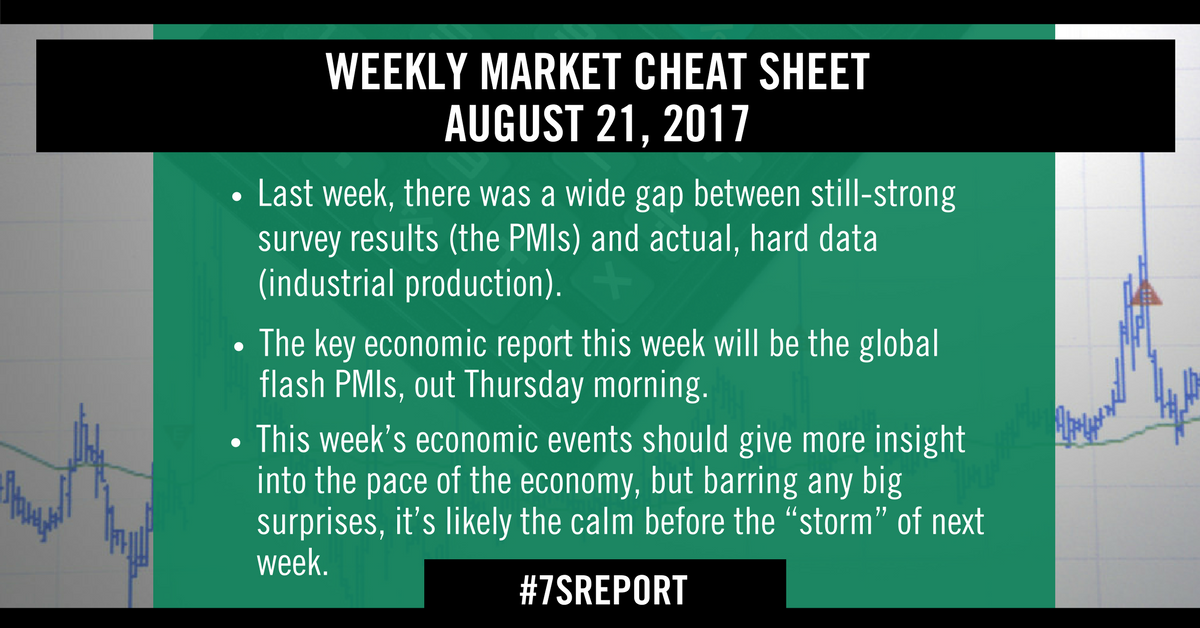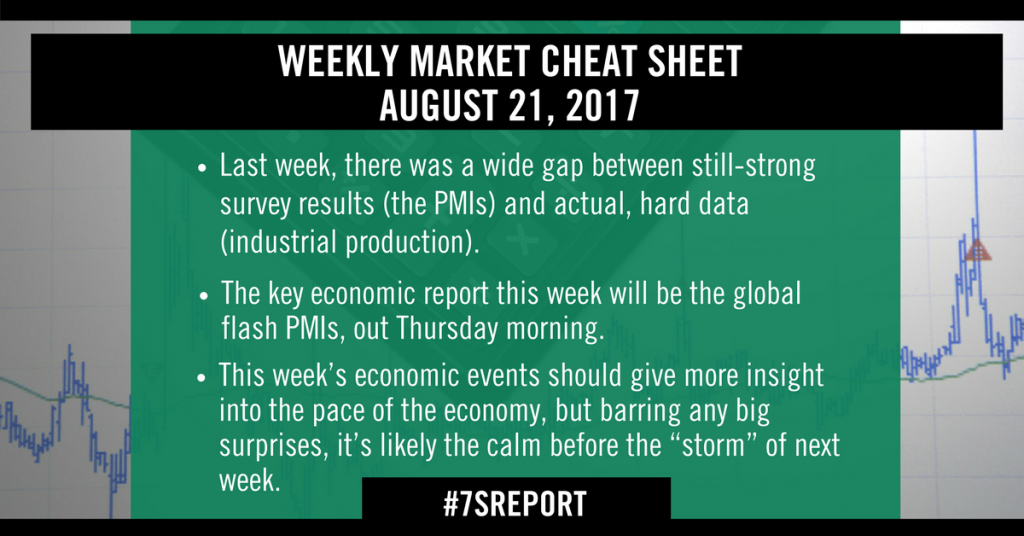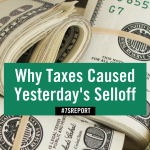Weekly Market Cheat Sheet, August 21, 2017
Join hundreds of advisors from huge brokerage firms like Morgan Stanley, Merrill Lynch, Wells Fargo Advisors, Raymond James and more… see if The Sevens Report is right for you with a free two-week trial.
Last Week in Review
There were some puts and takes from the economic data last week, but in aggregate it didn’t change the outlook for the US economy (still slow but steady growth) or the Fed (balance sheet reduction in September, a rate hike in December dependent on inflation).
I say puts and takes, because there were some decent economic reports last week, starting with a strong Retail Sales report. July retail sales beat estimates on both the headline (up 0.6% vs. 0.3%) and in the more important “Control Group” (retail sales ex-autos, gas and building materials), which rose 0.6% vs. (E) 0.4%, and saw a positive revision to June data.
That was a legitimate uptick in activity and an economic positive, although it remains to be seen whether that strength in consumer spending can be sustained past back-to-school and summer-vacation season.
The other highlights from last week were the August manufacturing surveys. August Empire Manufacturing surged to 25.2 vs. (E) 9.8 while Philly Fed Manufacturing also beat estimates at 18.9 vs. (E) 17.0. To boot, New Orders were strong in both reports (20.6 for Empire and 20.4 in Philly).
According to that type of data, we should see a big uptick in manufacturing activity in August, although I’ll again caution that these are surveys. And, unfortunately, with the exception of retail sales, the other “hard” economic data didn’t match these very strong survey results.
Specifically, July Industrial Production missed estimates, rising 0.2% vs. (E) 0.3%. But, more disconcertingly, the manufacturing subcomponent dropped -0.1% vs. (E) 0.2%. A lot of that decline was auto related, so it’s not quite as bad as it appears.
But, the overarching takeaway from last week’s data is that a wide gap remains between still-strong survey results (the PMIs) and actual, hard data (industrial production). We need that hard data to get consistently better if we have any hope of a rising economic tide carrying stocks higher for the rest of the year.
Turning to the Fed, the July meeting minutes were released last week, and while the market traded as though the minutes were slightly “dovish,” the reality is that they were neither hawkish nor dovish. The minutes confirmed that the Fed will reduce the balance sheet in September, although a rate hike in December seems very much 50/50.
Bottom line, it wasn’t a bad week for economic data, but we need evidence of economic acceleration to help push stocks higher, and that continues to be elusive.
This Week’s Preview
In aggregate, this is a quiet week for economic data (next week is the important week, as we get final global PMIs and the August jobs report), but there are still some potentially market-moving events to watch.
First, the Jackson Hole Policy Conference (i.e. conference/summer vacation) starts Thursday and runsthrough the weekend. The big names will be there: Draghi, Yellen, Carney, Fischer… but don’t expect anything that will move markets. It’s been made clear that Draghi doesn’t want to drop any hints about tapering until the ECB meeting in September (basically three weeks away). With the Fed, we know what to expect…balance sheet reduction in September.
Looking past central bankers, the key economic report this week will be the global flash PMIs, out Thursday morning. Again, we’re looking for the national PMI to match the strength we saw in Empire and Philly last week. If it does, that will be taken as an anecdotal positive. Internationally, there shouldn’t be any big surprises in this number.
Beyond the flash PMIs, July Durable Goods (Friday) is an important report, because it will give us greater insight into the state of “hard” economic data. If Durable Goods shows an uptick in corporate spending/investment, that might put upward pressure on expected Q3 GDP, which would be equity positive.
Bottom line, this week’s economic events should give more insight into the pace of the economy, but barring any big surprises, it’s likely the calm before the “storm” of next week.
Time is money. Spend more time making money and less time researching markets every day. Subscribe to the 7sReport.com.










